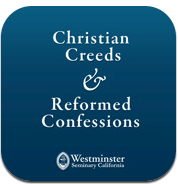Kim is working through the Canons here.
reformed confessions
Natural Law and Light in the Reformed Confessions
One of the more interesting ways in which theonomy is contra confessional is its Barthian-like rejection of the classic Reformed doctrine of natural law and implicitly it’s skepticism regarding natural revelation.
New from Westminster Seminary California- Free iPhone App – Christian Creeds and Reformed Confessions
If you’re an iPhone, iPod touch user and interested in the Reformed faith then have we got a gift for you: a free iPhone app from WSC. This app contains the ecumenical creeds and Reformed confessions. Thanks to app developer James H. . . . Continue reading →
Natural Law and Light in the Reformed Confessions (Updated)
Originally posted Oct 29, 2008. Revised April 4, 2011. In the modern period, particularly in the 20th century, many Reformed folk became uneasy with the traditional Reformed language concerning “natural law.” As one who began to enter the Reformed world circa 1980 . . . Continue reading →
HT/ST615 Reformed Confessions (Three Forms of Unity)
Course Description An introduction to the background, doctrine, and use of the Reformed Confessions. Spring. 2 Credits. The Student Learning Outcome for the Historical Theology Program: The student demonstrates understanding of the main eras of church history, the significant issues, and leaders/theologians of each. . . . Continue reading →
One God, Three Persons. Full Stop.
The biblical, catholic, Christian doctrine of the Trinity is startlingly brief: God is one in three persons. Yet, the moment we pronounce that little formula, we’ve stepped off the pavement and into deep waters. To those outside the faith, our claim that . . . Continue reading →
Office Hours: The Theology Of The Westminster Standards
The Westminster Standards are a collection of churchly documents, a confession of faith, and two catechisms drafted by an assembly of pastors and theologians called to meet to provide a confession and catechisms that would unify a nation divided internally by civil . . . Continue reading →
Office Hours: John Fesko On The Holy Spirit In The Reformed Confessions
This is season 7 of Office Hours and our theme is “The Holy Spirit: Lord and Giver of Life.” When we think of the Reformed and Presbyterian confessions we might think first of the doctrines of grace and salvation but they reflect . . . Continue reading →
Trans-Confessional Catechism? A Review Of The New City Catechism
It’s encouraging to the see the The Gospel Coalition talking about the importance of catechesis. I was encouraged when The Resurgence did a series on the Heidelberg Catechism (which I can no longer find) and it’s encouraging to see Carl Trueman’s new . . . Continue reading →
Recommended: URCNA Forms And Confessions
Along with the new Trinity Psalter-Hymnal (emphasis on the Psalter) produced in cooperation with the Orthodox Presbyterian Church, the United Reformed Churches in North America have also produced a book of liturgical forms, prayers, and confessions, namely the Three Forms of Unity: the . . . Continue reading →
The Canons Of Dort In Swahili
The Three Forms of Unity are now in Swahili. The third of the forms, the Canons of the Synod of Dort are now translated into Swahili. Continue reading →
We Subscribe
The Reformation was above all a doctrinal reform in the life of the church. Throughout the Middle Ages, calls for reform had primarily been concerned with the moral life of the church. The Reformation certainly resulted in profound moral and spiritual renewal . . . Continue reading →
Heidelcast For June 19, 2022: What Happens When Christians Try To Be “Relevant” And Why The Focus On The Confessions?
Despite our fondest wish to get back to the series on the Canons of Dort, the Science tells us that that it is time for only our second ever best of episode. In this episode we feature some audio from January 2010, . . . Continue reading →
Engaging Confessional Baptists on Covenant Theology (Part 2): Unity of Salvation in the Old and New Testaments
This two-part series engages recent confessional Baptist publications on the nature of covenant theology in order to help Reformed readers understand the Baptistic view better and to have some starting points for responding to it. Part one looked at new developments in . . . Continue reading →






